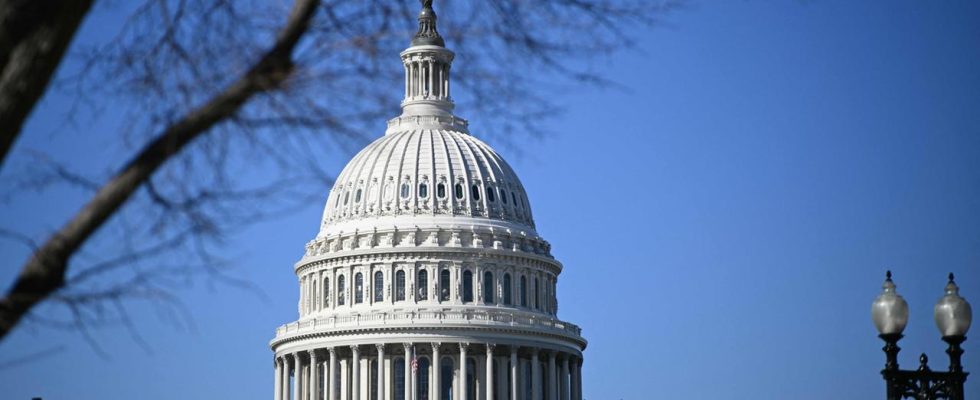The US Senate is blocking further aid to Ukraine, thereby putting worry lines on Europeans’ faces. In Germany there is talk of a “foretaste” of Trump’s re-election. Chancellor Scholz appeals directly to the US partners.
After the failure of the new Ukraine aid before the US Senate, German and European politicians expressed criticism and concern towards Washington. Before his trip to the USA today, Chancellor Olaf Scholz appealed to his American partners to continue to support Ukraine together.
“Our message is clear: We are doing our best to prevent Russia from winning the war,” Scholz wrote in an article for the Wall Street Journal. “The long-term consequences and costs of failing to stop Putin would dwarf any investments we are making now,” warned the Chancellor. Scholz wants to meet with US President Joe Biden and members of Congress in Washington. Aid to Ukraine is likely to be the central topic of discussion.
In an article for the Wall Street Journal, Scholz pointed out that the EU and its members were Ukraine’s biggest supporters with 84.4 billion euros. In doing so, he wants to dispel criticism that Europe is doing too little to support the country attacked by Russia.
Roth sees warning signals
On Wednesday, another attempt by US President Joe Biden to get his billion-dollar military package, which provides aid for Ukraine – but also for Israel – through the Senate failed due to Republican votes.
The chairman of the Foreign Affairs Committee in the Bundestag, Michael Roth, viewed the failed draft law as a warning signal. “The blockade of Ukraine aid in Congress is just a first foretaste of what could happen if Donald Trump is re-elected to the White House in November,” the SPD politician told the news portal “t-online”. “Europe’s security would then no longer be guaranteed from one day to the next,” warned Roth. The future of “free and independent Ukraine would be in grave danger.”
“We must finally wake up and prepare for a possible Donald Trump presidency by investing massively in our own security,” said CDU foreign policy expert Norbert Röttgen. With regard to the Republicans’ blockade policy, he added: “This policy is devastating for the US’s foreign policy weight.” It weakens the allies’ trust in the USA and encourages states such as China and Iran to challenge the USA militarily.
Strack-Zimmermann emphasizes the role of Europe
For Green Party politician Anton Hofreiter, the rejection of aid to Ukraine makes clear the extent of Donald Trump’s influence on the Republicans. You can see that the Republicans “ultimately submitted to Trump and, in case of doubt, Trump is close to Putin,” said Hofreiter on RTL/ntv.
Preparing for Trump’s possible re-election is not easy, he said, referring to the federal government. “I also think you have to realize that if Trump were in the White House, it would be a catastrophe for the entire world.”
The chairwoman of the Defense Committee, Marie-Agnes Strack-Zimmermann, told t-online that the US Senate’s decision was regrettable, but not a surprise. “Europe must be aware that the US could fail to support Ukraine in the future, regardless of the outcome of the November election.” Germany must take on the leading role in Europe.
Tusk: “Reagan is turning in his grave”
Polish Prime Minister Donald Tusk also sent sharp words to the US Republicans. “Dear Republican Senators of America. Ronald Reagan, who helped millions of us regain our freedom and independence, must be turning in his grave today. Shame on you,” he wrote on the X platform.
Reagan, who died in 2004, served as US President from 1981 to 1989 and, with his then controversial policy of rearmament and anti-communist stance, made a decisive contribution to the end of the Cold War and the collapse of the Soviet Union.
Blockade in House of Representatives threatens
The so-called National Security Amendment, which was rejected in the US Senate, includes, among other things, $60 billion to support Ukraine. Also planned are $14.1 billion in support for Israel and $20.2 billion for border security.
The Republicans had already announced their rejection of the package of measures in advance. For months they had insisted that additional aid for Ukraine and Israel be linked to measures to curb illegal migration in the country. This is a central issue in the US election campaign. Former President Trump has urged his party colleagues not to compromise on this issue. Many Republicans then rejected the legislative package when it was released last Sunday, even though it contained many of their demands.
Nina Barth, ARD Washington, tagesschau, February 8, 2024 7:04 a.m

